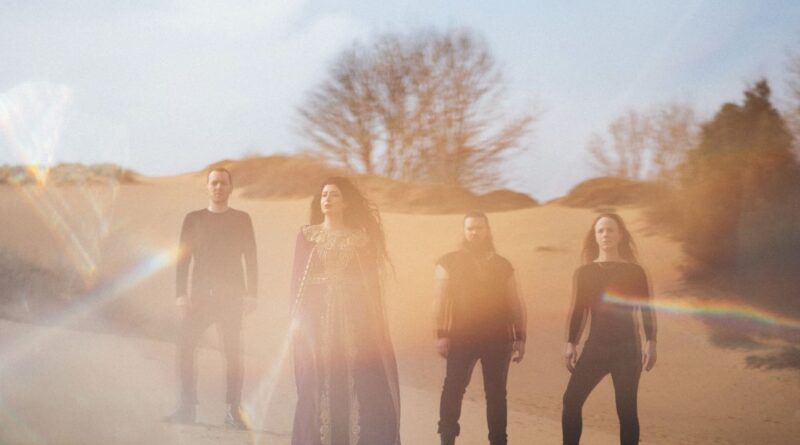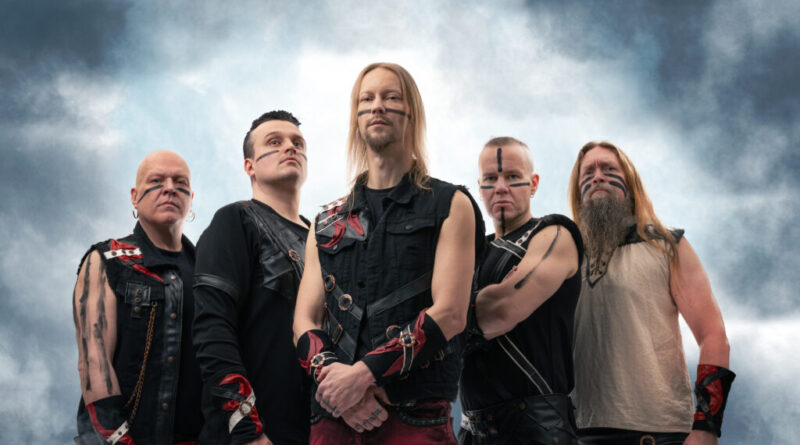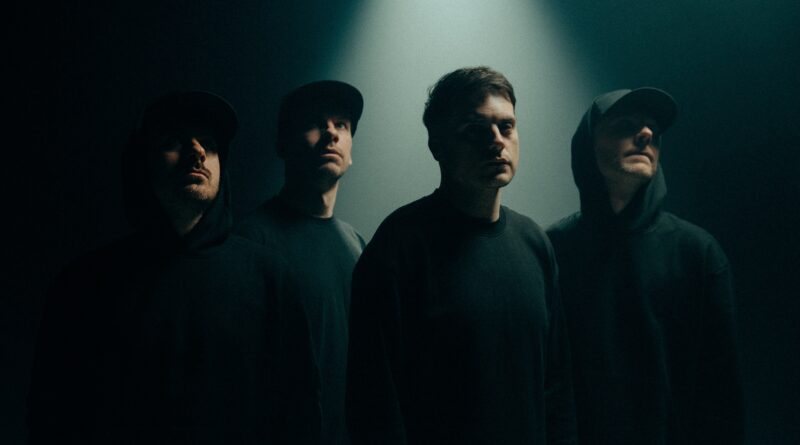
As we approach the denouement of 2024, when music critics are frantically working on their Album Of The Year lists, one thing is for certain: You’re bound to see Do Not Go To War With The Demons Of Mazandaran, the new offering from LOWEN, make an appearance on more than a few metal journo’s lists. An incredible piece of work that combines BOLT THROWER style riffs with Middle Eastern folklore, political rage, and the jaw dropping powerful pipes of vocalist Nina Saeidi, it has turned more than a few heads since its release in October.
One of the most remarkable things about Demons… is just how much of a step up it is from their 2018 debut, A Crypt In The Stars. While there were glimpses of the band’s vision and talent on that record, the leaps forward they’ve made in their songwriting, performance and production are nothing short of remarkable. Nina and her co-writer Shem Lucas have clearly been hard at work in the intervening years. Recruiting a new drummer, Cal Constantine to bring a thunderous backbeat to the band was just the start of it.
“A lot of stuff happened,” Nina confirms. “When me and Shem started the band I wanted to be distinctly Middle Eastern but taking those ideas and expressing them in a way you hear them in your head is not an easy thing to do when you’re just starting out and finding your feet as a musician. It took us years of study. We worked with ethnomusical archaeologists and I did courses in microtonal singing. It’s a constant work in progress and we’re still studying and improving.”
While their debut was very much in the slow and brooding doom metal oeuvre, the way LOWEN have introduced death metal elements in Shem’s intricate riffing and Cal’s frantic drumming have injected an irresistible vitality to LOWEN’s sound. It’s something that Nina was keen on. “I think death metal is one of those genres where when you mix it with another genre of music it really works. A lot of death metal bands already have a middle eastern influence and I really wanted to highlight that by having an authentic Middle Eastern voice in there.”
And authentic it is. Nina is of Iranian heritage, having been born in exile after her parents fled the 1979 revolution that led to an oppressive religious regime taking power. She finds herself a complex dichotomy of having a deep and personal connection to a place she may never get to visit.
“It’s heartbreaking, honestly. During the writing of the album, my grandmother was at the end of her life, and I had a lot of conversations with her while she was literally on her deathbed, and she was like, ‘when are you going to come and see me?’ It’s such a difficult thing to experience. I could get on a plane and just go and see her, but I would be arrested at the airport. I’d get executed. And I remember growing up like I’d be talking to my grandparents and aunts and uncles, and you’d literally hear the phone tapping as your your conversations are being listened to. So yeah it’s a huge part of my identity that I’ve never been able to fully connect with.”
Unable to visit her homeland, instead she found connection through the country’s rich cultural and literary heritage, most notably the epic poem Shahnameh, or, The Book of Kings, a section of which became the title of the new LOWEN album.
Nina laughs at the suggestion that writing the album must have been like studying for a PhD. “It’s funny you should say that as I’m a PhD drop out. Maybe this album is my thesis! But yeah I was searching for a point to start writing and exploring from and I was reading the Shahnameh because it has so much mythology and the foundational myths of Iran in it. I wasn’t even halfway through and I found the chapter Do Not Go To War With The Demons Of Mazandaran. And I was like, ‘this is amazing’. I told the story to Shem, and he was like, ‘that’s going to be the album title!’ It was the perfect springboard for exploring the rest of the album’s themes.”
Those themes are as heavy as the music through which it is expressed. Through the poetry and mythology, Nina explores weighty topics such as oppression, especially of women, with all her rage expressed through a powerful vocal performance that uses the heart wrenchingly expressive singing style Tahir, rather than the death growls one would usually associate with the style of music from LOWEN. “I think sometimes it’s a lot scarier when you hear anger that’s not expressed as a shout or a word or like a screen, I think you know, like when you get in trouble at school, and like the teacher, instead of shouting at you, talks really quietly.”
To be able to express herself in such an articulate and powerful way took a lot of work. When starting LOWEN, she didn’t even see herself as a singer. “I’ve worked with quite a range of vocal teachers. I worked a lot with someone called Lila de Souza in Hertfordshire. I did some vocal training with a woman that does a lot of people in the West End. She was really Christian though and when she realised what the lyrics were about, she dropped me. We also worked with this amazing musician called Saeid Kordmafi, who collects old folk music from specific towns in Iran and is pitch perfect on a microtonal level.”
If studying epic poems and learning microtonal singing wasn’t enough, Nina also taught herself to play exotic instruments such as the Santur, or hammered dulcimer, a 56 stringed cousin of the guitar, which she used to add further depth to the rich sonic tapestry on Demons… “I had that hand made for me in Iran and it was smuggled across international borders. Not in a super illegal way but you can’t just buy them in the UK at that quality anyway.”
With this level of dedication, passion, and sheer devotion on an artistic and human level it’s no surprise that LOWEN are making such waves across the UK underground metal scene at the moment, and will surely continue to do so for years to come.
Do Not Go To War With The Demons Of Mazandaran is out now via Church Road Records.
Like LOWEN on Facebook.






 Yinyang live @ Whelans, Dublin. Photo Credit: Orla Joyce
Yinyang live @ Whelans, Dublin. Photo Credit: Orla Joyce Meryl Streek live @ Whelans, Dublin. Photo Credit: Orla Joyce
Meryl Streek live @ Whelans, Dublin. Photo Credit: Orla Joyce Meryl Streek live @ Whelans, Dublin. Photo Credit: Orla Joyce
Meryl Streek live @ Whelans, Dublin. Photo Credit: Orla Joyce




